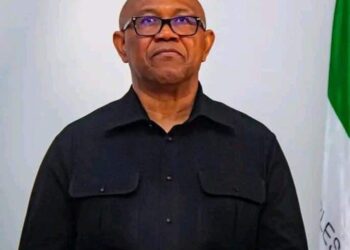Six days ago, precisely Thursday last week, an executive bill seeking exclusive control and management of rivers and lakes by the federal government ran into troubled waters at the last stage with senators arguing for and against the provisions of the Bill along North and South divides. TAIYE ODEWALE highlights the contentious issues.
Argument over management of water resources The contentious Bill is called “A Bill for an Act to establish a regulatory framework for the water resources sector in Nigeria, provide for the equitable and sustainable development, management, use and conservation of Nigeria’s surface and ground water resources and for related matters”.
It provides among others that “The right to the use, management and control of all surface water and ground water affecting more than one State pursuant to Item 64 of the Exclusive Legislative list in Part l of the Second Schedule to the Constitution of the Federal Republic of Nigeria, 1999 as amended, and as set out in the First Schedule to this Act, together with the beds and banks, is vested in the Government of the Federation to be exercised in accordance with the provisions of this Act.
The Bill in its section four equally dictated that “As the public trustee of the nation’s water resources, the Federal Government, acting through the Minister and the institutions created in this Act or pursuant to this Act, shall ensure that the water resources of the nation are protected, used, developed, conserved, managed and controlled in a sustainable and equitable manner, for the benefit of all persons and in accordance with its Constitutional mandate” Trouble beckons Though the bill despite the somewhat contentious provisions inherent in it, scaled through second reading last September and Public hearing stage January this year, but it ran into trouble waters during clause by clause consideration for possible third reading after the presentation of report to that effect by the Chairman, Senate Committee on Water Resources, Senator Ubali Shittu (APC Jigawa North East).
The senator in his presentation submitted that the federal government should be empowered to have absolute control over water banks and resources in Nigeria.
First to kick against the bill at that stage of the Senate Committee of the Whole chaired by the Senate President, Bukola Saraki was the Senate Minority leader and former Akwa Ibom State governor, Senator Godswill Akpabio who drew attention of his colleagues to the fact that the Bill could deprive people living along river banks of their basic livelihood. Clause 3 Akpabio, who specifi cally raised issues against Clause 3, warned against making a law that would lead to the federal government taking over the landed areas of riverine communities, especially communities where the water bodies dry off . “When the rivers dry off , they become residential. So, it will cause a lot of confusion. We really need to be careful,” he warned. Akpabio made reference to Lake Chad which water he said used to cover 25,000 kilometres of land but had dried up to about 5,000 kilometres. He said it meant that the community now had 20,000 kilometres for farming and other activities, stressing that it would have been out of the reach of the people if the government had possessed the bank. He said, “The kind of river we are talking about should be clearly defined. If we want to say that all waters in Nigeria must be legislated upon by the Federal Government, then we will cause a lot of confusion because there are a lot of communities that depend on small rivers to survive.
But the Majority Leader, Senator Ahmad Lawan (APC, Yobe-North) in a spirited attempt to save the bill, quickly rose to counter Akpabio, stating that the lawmaker was arguing in error. Lawan noted that the clause was in reference to waters like River Benue and River Niger which flow through several states. He urged the Senate to ignore the issues raised by those opposed to the bill. According to him, the federal government is not interested in waters within a state. Akpabio, however, insisted on his earlier position, saying, “I am saying that the essence of making law is for the law to stand the test of time and not bring more confusion.” He cited the example of a small river in Akwa Ibom, a part of which is in Abia State.
He noted that such rivers would be affected despite being small. He also cited the example of the Cross River which has its source in the Cameroon Mountain and passes through Cross River State to Akwa Ibom and into Abia States. Akpabio therefore asked that rivers to be taken over by the federal government be listed in the bill. “This is going to lead to a lot of legal confusion and rumbling, and we are further depriving our citizens of the right to make use of the resource within their community. If we can deny our people a small water in their area because the water touches the next village which is in another state, automatically we are overlegislating.
“If the banks now belong to the federal government, we are doing what we are not supposed to do; we are centralising power at the centre, we are not devolving power. We are bringing Nigeria back to a unitary state. We are now making sure that even communities are now dispossessed of their land. Some of those places are natural elongation of the land”, he explained. Regional divide Also kicking against the bill, Senator Emmanuel Paulker (PDP, Bayelsa-Central) in his contribution argued that there was a need to defi ne what a bank is. He also pointed out that the federal government was about to take over resources in the states at a time when Nigerians were calling for devolution of power. “Most of these Rivers dry off , they are seasonal rivers. If we say banks are owned by the Federal Government, definitely it will create a lot of problems. We should look at it closely before we pass it.
Most of the waters are drying off , so how do we defi ne the banks? “, he queried. Senator Solomon Adeola (Lagos West) in his own contribution cautioned that the entire bill should be reconsidered since it has become controversial. Adeola noted that like Akpabio, he has serious reservation about the Bill. He said that the Lagos State Government has issues with the Nigeria Inland Water Way Authority over the control of water resource which is already at the Court of Appeal. Th ough supports came for the bill from Senators Ibrahim Gobir, Binta Masi Garba , Adamu Aliero etc, but their contributions couldn’t pushed it through that day . Senator Binta Masi Garba in her defence of the bill said: “since the Federal Government is managing the ‘Trunk A’ roads why will the Federal Government not manage designated rivers?,”.
Bukola’s smart move Expectedly, in a bid to prevent the debate from deteriorating and creating more troubles, Senate President, Bukola Saraki, cut the debate short and ruled that the Bill should be referred to an adhoc committee made up of the Water Resources Committee Chairman, Shitu, Deputy Chairman, Bwacha, Chairman of the Senate Committee Judiciary, David Umaru, director legal services and Senator Barnabas Gemade, to reconsider the clause and report back in one week. “We want to ensure that whatever we do stands the test of time. We should be guided in whatever decision we want to take. They should report back in one week,” he said. As the week given for the ad- hoc committee is here, Nigerians and political watchers in particular, wait for whatever guided decision the Senate will take on the bill.
Blueprint gives you the latest Nigerian news in one place. Read the news behind the news on burning National issues, Kannywood, Videos and the Military



